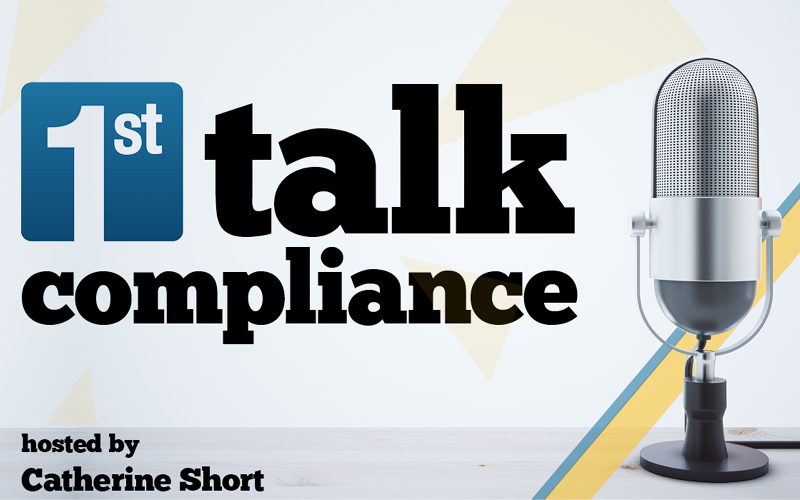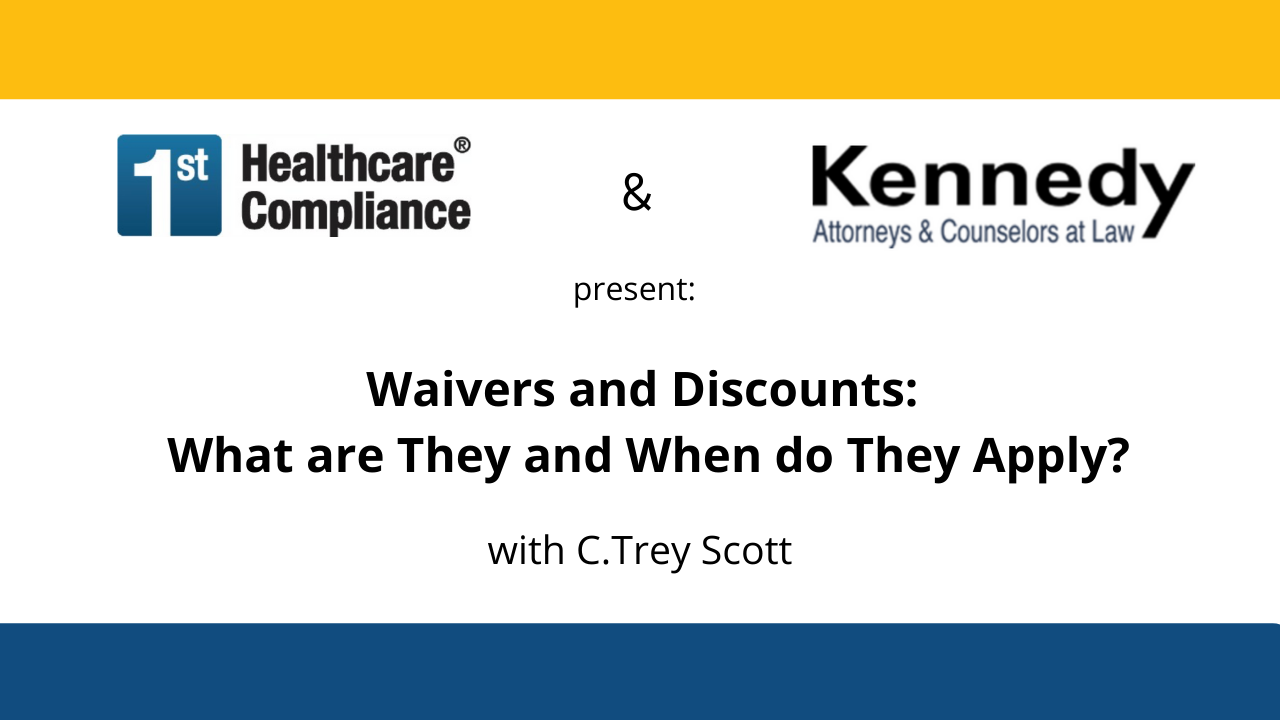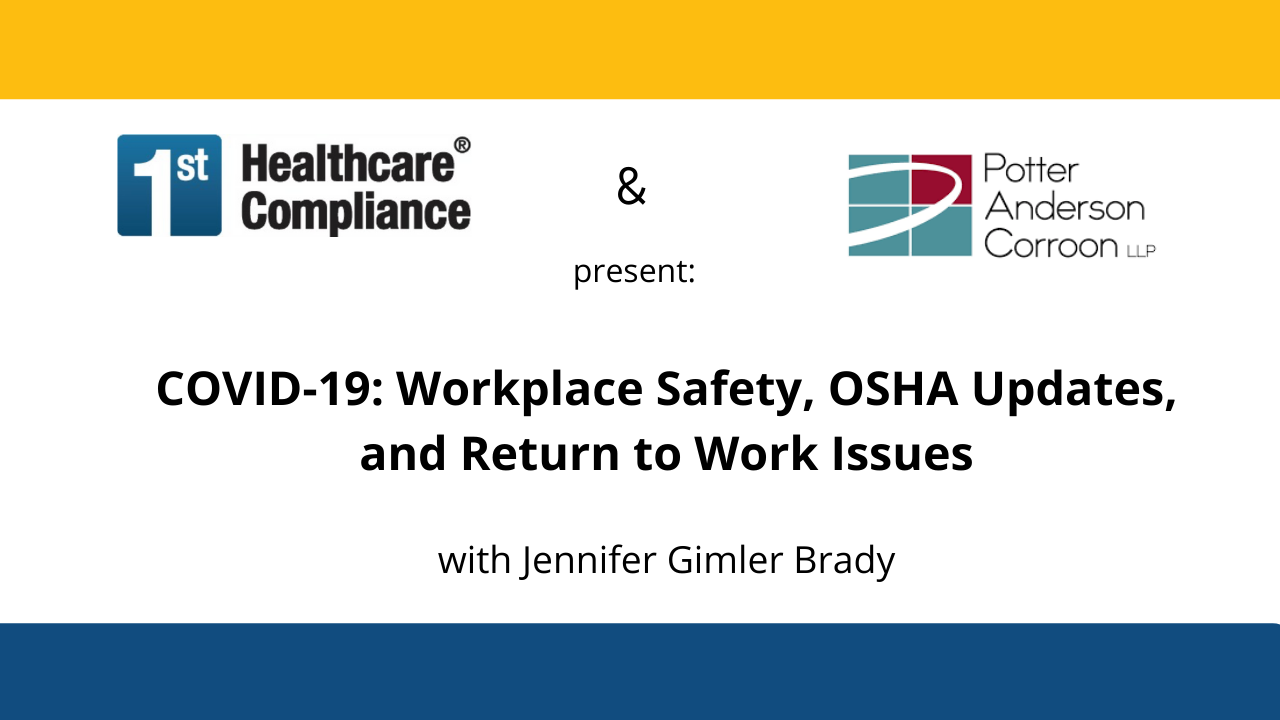Healthcare and Technology Negotiations

Catherine Short converses with Rachel V. Rose, JD, MBA, principal with Rachel V. Rose – Attorney at Law, P.L.L.C., Houston, TX and Bruce J. Lynskey, Co-Founder at ePrevenir, on the topic of “Negotiations in Healthcare and Technology.” Negotiating occurs in every facet of business and law. From contractual negotiations through settlement negotiations, it is a delicate dance. There are a variety of classic negotiation techniques, which include extreme posturing and “anchoring”. Healthcare and cybersecurity present unique challenges because of the looming exposure to a government investigation and either a civil and/or criminal action, even if a settlement is reached between two private parties. Here we will discuss approaches when negotiating contracts, settlements, and other items, which arise in healthcare and the cybersecurity industries.
Subscribe: Amazon Music | Email | RSS | More
Catherine Short:
Welcome and let’s first talk compliance. I’m Catherine Short, partnership Marketing Manager at First Healthcare Compliance. Thanks for tuning in.
This show is brought to you by First Healthcare Compliance as part of our commitment to provide high-quality, complementary educational resources. We help create confidence among Compliance professionals throughout the United States. Please show your support by taking a moment to provide a review on Google, Facebook or iTunes. You can follow us on Instagram, Twitter, and subscribe to our YouTube channel.
On today’s episode, we are speaking with Rachel V. Rose, JD, MBA, Principal with Rachel V. Rose – Attorney at Law PLLC, Houston, Texas, and Bruce Lynskey, Co-founder at ePrevenir Inc., an intelligent cloud-based point and click decision support tool used by providers with diabetic patients on negotiations in healthcare and technology. Negotiating occurs in every facet of business and law. From contractual negotiations through settlement negotiations, it is a delicate dance. There are a variety of classic negotiation techniques, which include extreme posturing and anchoring. Healthcare and cybersecurity present unique challenges because of the looming exposure to a government investigation, and either a civil and or criminal action, even if a settlement is reached between two private parties. Here we will discuss approaches when negotiating contracts, settlements, and other items which arise in healthcare and the cybersecurity industry.
Before I begin, I would like to mention at First Healthcare Compliance, we strive to serve as a trusted resource for compliance professionals, and every month we celebrate their hard work and dedication with our compliance Super Ninja recognition. For this episode, we are spotlighting Super Ninja Julie Garcia, Business Office Manager at Coastal Vascular Center. Julie says “Coastal Vascular Center has three office locations and yet the whole group works as a team. They all respond well to the compliance updates and changes. I am fortunate to have such a close-knit caring group of professionals to work with every day.” Congratulations, Julie! Our team is honored to have the privilege of working with you.
Hello, Rachel and Bruce, thank you so much for joining me today on First Talk Compliance.
Rachel V. Rose: 2:33
Thank you, Catherine. We’re delighted to be here.
Catherine Short: 2:37
Thank you. I’m so glad you both are here. So what are some important general takeaways that you have learned from various types of negotiations?
Rachel V. Rose: 2:48
Bruce, do you want to begin from how you approach negotiations and then the key takeaways from the ending?
Bruce Lynskey: 2:58
Sure, thank you, Rachel. Some general takeaways. First, the types of negotiation. You will do ongoing negotiations that will take place over an extended period of time, let’s say extended period of time meaning greater than two weeks. It could be a multifaceted contract that you’re working on and you will negotiate bit by bit with the other parties. Others are short and sweet and negotiations. Those take place quickly, sometimes without much advance warning. Some general takeaways that I learned over a number of years from doing negotiations is first and foremost, be prepared. You usually have some advanced warning that negotiation is going to take place. If it’s an extended negotiation, for example, the contract that I cited, you have plenty of time to prepare, you understand who is going to be sitting at the other side of the table, and you have time to learn about that person if you don’t already know them. The most important rule is be prepared. Do your homework when you show up for the negotiation. Otherwise, you’re at a significant disadvantage from which you won’t recover. Rachel, do you have any?
Rachel V. Rose: 4:27
I would just add, Bruce, to get yourself as a negotiator into a mindset, and building on what you articulated in terms of anticipating who your opposing parties are. It’s critical to have someone in the bullpen so to speak or identify that person upfront so that you’re not necessarily walking into a situation where you have a room full of people just against you as an individual.
Bruce Lynskey: 4:59
Right. If I can add another takeaway, ultimately, you’re going to be negotiating with every type of person you could ever imagine having met. The golden rule is no matter with whom you’re negotiating, stick to your business demeanor. Some people you negotiate with will try to be very informal, others will probably be emotional, and they could even get personal in the negotiations, no matter what, the rule of thumb is stick to the business. By doing so, you are letting the other person do the acting or acting up in the negotiation and you’re there for the real reason. Stick to the business. Here’s the next thing we need to discuss, let’s begin, and so forth. If the other person is full of energy and histrionics and emotional, you’ll eventually tire them out by sticking to the business. Just let them know what a boring person you are, and that the reason you’re here is to get the business done, period.
Catherine Short: 6:11
If you could explain, for our listeners who are perhaps new to negotiations, what are the different types of negotiations?
Bruce Lynskey: 6:22
You’re always negotiating. Even outside of business, you’re negotiating, whether you realize it or not, it’s part of coexisting with other people. In the business environment, it’s typically agreements. Agreements are captured in contracts. Within agreements, you could be negotiating who’s responsible for what, you’re doing a business agreement, there’s obviously a business partner, you could be pricing services that you are selling to the business partner, you could be bartering with the business partner too. That’s what usually is. As part of the negotiation, there will be something about liability and it’s typically releasing yourself as much as possible from any liability having to do with what you’re negotiating.
Rachel V. Rose: 7:17
Bruce, you brought up a great point, and also an interesting scenario in the healthcare forum and cybersecurity, check forum as well. But with your experience with V and now ePrevenir. In my experience in healthcare, one contract that comes up quite a bit is the Business Associate Agreement between a covered entity and a business associate, or a business associate and its subcontractor, which is required under HIPAA. The fundamental premise of that particular contract is that both parties are setting forth that they have the requisite technical, administrative, and physical safeguards in place in order to protect the confidentiality, availability, and integrity of that data. One item that you just mentioned in terms of liability often comes in the form of an indemnification provision. In approaching indemnification provisions, I always advise my clients in relation to the following. First, have you done business with this entity before? That is a crucial question because if you have a course of dealing with someone, that’s very different than entering into an agreement with an organization or a person that you have no frame of reference of doing business with before. Secondly, you don’t want to assume liability unnecessarily, and you don’t want to make it one-sided. Whenever I do indemnification, I always make sure that it’s mutual, meaning that both parties are absolving, if you will, the other party of the same types of liability. Also, what I’ve been doing more and more lately is carving out a limitation in terms of cybersecurity breaches of any type, meaning that if it is the breaching party, then they are responsible for paying for the notices to the patients, for the notices to the media. There’s only one other thing that I’ve negotiated in there, and it depends on who I’m negotiating with. Basically, just the fundamental requirements of any statute in terms of notification. What that does is that the next sentence says that the parties will pay for their own legal fees, any forensics that they have done, etc. Right off the bat, both parties know what they’re in for in the event of a breach. I think that type of negotiation is critical.
Catherine Short 10:10
Something that comes up and every single day I’m all over the world, whether it’s a healthcare, entity, or otherwise, are cyber-attacks. What is usually negotiated when a cyber-attack occurs, and with whom?
Bruce Lynskey: 10:24
Let me preface this by saying, from my high technology background, there’s no such thing as being 100% safe from a cyber-attack. Any responsible organization dealing with this matter has to assume there’s going to be a cyber-attack and then go from there as far as figuring out how we’ll deal with it.
Rachel V. Rose: 10:47
No, you’re exactly right, Bruce. Building on that as well as Catherine’s question, in today’s landscape, there are a lot of different laws to deal with. First and foremost, in the event of a cyber-attack, which ends up being a reportable breach, there are potentially a multitude of government entities that need to be notified and then down the line, a lot of those entities you will be negotiating with individually. On a worldwide scale that is very significant. In terms of who else you’ll be negotiating with, it will be a government entity, typically, it will be counsel for the entity that has been harmed, it could be individuals, for example, if we take one of the retail cyber-attacks such as Target or Neiman Marcus or Home Depot, oftentimes those cases go to court so then you have to set up a claims administrator, there’s either a class action or a multi-district litigation scenario, which ensues, so there could be negotiations down that line as well. The one area that you want to avoid negotiations in is direct negotiations with the entity that perpetrated the cyber-attack and the biggest reason for that actually, is because you don’t always know who is behind the wall, so to speak, or who you are dealing with. In the fall of 2020, the Office of foreign asset control, which is under the US Department of the Treasury, issued two bulletins that encouraged people to contact law enforcement first, because some of the state actors that are involved in the cyber-attacks are actually precluded from doing business with the United States or United States citizens. That could in turn open yourself or your company up to criminal liability for different financial transactions that occur over typically a wire scenario.
Catherine Short: 13:01
If you’re just tuning in, you’re listening to first talk compliance brought to you by First Healthcare Compliance as part of our commitment to provide high-quality, complimentary educational resources. We help create confidence among compliance professionals throughout the United States. My guest today is Rachel V. Rose, JD MBA principal with Rachel V. Rose Attorney at Law PLLC, Houston, Texas, and Bruce J. Lynskey co-founder ePrevenir, on the topic of negotiations in healthcare and technology. Please show your support by taking a few minutes to provide a review of healthcare compliance on Google. You can also follow us on Instagram, Twitter, and subscribe to our YouTube channel.
As far as negotiations go, what are your most utilized techniques in healthcare or cybersecurity or any type of negotiations for that matter?
Bruce Lynskey: 13:59
Okay, something I’ve mentioned that I like is, always do your homework. We’ve said that. Do your homework thoroughly. Understand with whom you’re dealing with. What are the key points in the negotiation? Which of the two parties is going to gain the most value from this negotiation? Typically, in a negotiation, someone approached the other party. Negotiations don’t occur spontaneously. Someone has something to gain from a successful negotiation. Understand that terrain. A technique that I use when possible is, of course, I try to always remain businesslike, but I do act a little bit and I try to come across as a bit naive or green to the situation, or not really in control of understanding all the different components, and you watch intently the other party to see if they’ve picked up on that and start to take advantage of it. You let them take advantage of the situation because they don’t believe that you understand all the details of what you’re negotiating. That usually ends up putting you in a superior position, assuming that you understand everything.
Rachel V. Rose: 15:35
To build on what Bruce said, the two techniques that I like to utilize are: I like to prepare mentally, as well as doing the homework. So the emotional component. I’m a huge advocate of meditation both before and during, and I advise my clients the same, but perhaps more importantly, because it gives you different opportunities during negotiation is to always have a partner. A. there’s safety in numbers, B. you can deploy the good cop, bad cop type situation, or C. one person might be the primary driver, if they’ve established a good rapport, and the other person is taking notes and observing everyone else in the room. Those are the defaults that I always go to. Bruce?
Bruce Lynskey: 16:29
Those are very good. The idea that Rachel mentioned of having a partner is terrific provided that you can do it, you usually can. In a negotiation, it’s just known from the outset that that’s how it’s going to take place from your side. An advantage to having a partner in the picture is, if you need to use the technique called good cop, bad cop. There is someone who’s going to take the blame for the bad aspects of this negotiation or the undesirable features in the agreement you’re trying to conclude. It’s very convenient to have one of the two of you take the role of the bad cop who absorbs all the bad karma that is happening in the negotiation, and the other one appears to be the good cop, the hero, and the one who will be able to get it done to the agreement of both sides and so forth. That’s a shrewd technique. Chances are, if you’re going to negotiate something that is quite involved or complicated, it’s probably good practice at the outset, to bring two of you into the picture right from the beginning so that you have the opportunity if you need, to play the good cop, bad cop role.
Catherine Short: 17:57
So besides good cop, bad cop, what about other mental components of negotiations, whether it’s reverse psychology, feigning boredom, appealing to emotions, false demands, genuineness or bullying techniques? What’s your perspective and what is your reaction to negotiating opposite the two major types of people in negotiations, unreasonable people versus people who are genuine and reasonable? What do you think?
Rachel V. Rose 18:30
Bruce, this one is all you. I think the genuine reasonable people from my perspective, I’ve literally been on a phone with someone and said, walk with me, right? And we were able to flush things out over the phone within 20 minutes. Tell me where your hang-ups are, I’ll let you know. And let me know a number that you’re comfortable with. I think one of the key issues in any negotiation is that very, very, very rarely does a person get everything that they are asking for, and I think you need to prepare yourself and your client that you’re not going to get everything that you are asking for in this negotiation. So that trends itself now to what Bruce is going to delve into how to deal with unreasonable people, which I think answers a lot of the feigning, the bullying and the tactics that are less than desirable to have to deal with Bruce.
Bruce Lynskey: 19:31
Okay. Thank you, Rachel. Rachel just mentioned, the high importance of doing your homework before you open the negotiations. A key part of that homework is understanding your base minimum that you’re willing to take because as Rachel pointed out in a negotiation, it is rare for either of the two parties to get absolutely everything that’s they want. Therefore, it’s up to you to know in advance what your minimum is that you will accept, what the best possible scenario is, the maximum you would love to have. I always make it a mental point to understand possibly two other steps in between. So we end up with four possibilities, the minimum, the maximum and two intermediate possibilities that are ordered in priority or about you. I know that walking in, if you read the other party you knew already, or they turn out to be a completely unreasonable person, and there are plenty of those out there, they’ll be ready for them. An unreasonable person is someone who appears to completely believe they have to have everything or nothing, and they are not willing to negotiate. They are excitable, they get histrionic, they get very emotional, and they can certainly get personal. So you wonder how in the world can I get anything done with this person?
One tactic to apply with this kind of person is try sticking to the business, let them perform, but just stay on course with the business. Indicate by your your total business like manner, and almost boredom with what’s going on, that you’re strictly in there for the business, you don’t care what they think of you, you don’t care how emotional they’re getting, it’s having no effect on you. That’s a tack to try. The worst case scenario, and it can happen, it hasn’t happened much but it will, every now and then, and that is the walk away. You understand two things going in there, you understand what the minimum is that you will accept because you did your homework, you also will read a situation, you need to be way more patient than the other side is. The other side’s being completely unreasonable. You’re exercising total patience, and you’re sticking to the business. But if no progress is being made whatsoever, you need to walk away. When you walk away, that’s it, that’s the end of this negotiation. You let the other party approach you in the aftermath. You never approach the other party to resume this. So when you make the decision to walk away, that’s a serious decision. It could be fatal in the sense that this is the end of any negotiation and that’s not going to resume. Understand that the walkaway is not something you casually use to get control of the negotiation. But I’ve had to do that a few times and of the times I had to do it, half of those times the other party eventually returned.
Catherine Short: 23:06
How about the role of silence? How does silence play in effective negotiations? Is it effective? Or does it stop negotiations?
Bruce Lynskey: 23:19
Silence is a great technique provided you know how to use it. Trying silence without understanding how to use it is like putting a gun into the hands of someone with no training. The appropriate time to use silence and when there was something that we refer to as the pregnant pause, both of you have paused, and now you’re waiting for someone to resume. In a negotiation situation, this will happen. If you’re dealing with a good negotiator, this will happen a lot because they currently have the upper hand and they are silent. They are pausing. What you need to do is remain silent and that’s really hard to do. But you need to remain silent. What the two of you are doing is essentially facing off with each other with your silence. The first one who speaks is going to be the one who likely ends up at the lower end of the deal.
Rachel V. Rose: 24:26
Right. There’s an article that MIT Sloan, that’s MIT Business School, published on silence, and to Bruce’s point, it can be exceptionally effective for a lot of different reasons. One reason is that it gives you time to think and that pregnant pause also makes people feel uncomfortable on the other side. If you want to try and see if someone will fill the air, just shut your mouth. It’s amazing what can come out. But to this point on the other side, it could be like two cats in a room, just staring each other down, and the first person who speaks is the least likely to prevail.
Catherine Short: 25:16
But this is an incredibly interesting and fascinating conversation. I believe that we’re just about out of time, though. So do either one of you have any other great advice for us or things that you’ve thought about? During our conversation that you wanted to share with our listeners?
Bruce Lynskey: 25:35
Yes, I’ll share something. Everyone is going to be involved in negotiations. That is part of business. It’s also part of life. You should look at negotiation as an art as well as a science. It’s a highly desirable skill, but you should grasp onto and plunge into it, relish it because it’s a very valuable skill. Just realize it’s an art and a science. The art is the subtleties that are so effective in negotiation. The science is the different tactics you can use, when you should use them, and so on. But it’s a mixture of the two.
Rachel V. Rose: 26:15
I concur with what Bruce said. One negotiates in life all of the time. The more you can hone those skills in an informal versus a formal setting, I think it will be very beneficial. I would just reiterate that it’s very important to prepare yourself emotionally and mentally, use techniques such as breathing, and also be able to grab a partner so that you have more options available to you during the negotiations.
Catherine Short: 26:54
Perfect. I wanted to thank you both for being here today on first talk compliance, so thank you so much.
Bruce Lynskey: 27:01
My pleasure.
Rachel V. Rose: 27:02
Thank you, Katherine, for having us.
Catherine Short: 27:05
Thank you to our audience for being here as well and for tuning in to First Talk Compliance. You can learn more about the show on our program’s page on Healthcarenowradio.com and lend your voice to the conversation on Twitter at @1sthcc or #1sttalkcompliance. You can also email me at catherineshort@firsthcc.com. I’m Catherine Short of First Healthcare Compliance. Remember, Compliance is the key to achieving peace of mind




